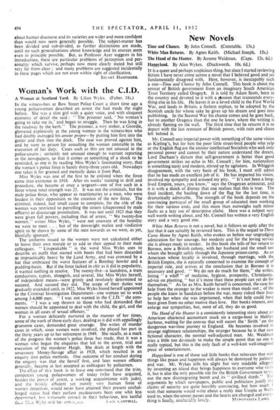New Novels
Time and Chance. By John Connell. (Constable. 15s.) IT is a queer and perhaps suspicious thing, but since I started reviewing fiction I have never come across a novel that I believed good and yet fundamentally disagreed with. Here, however, is inescapably such a one—Time and Chance by John Connell. This book is about the retreat of British government from an imaginary South American Trust Territory called Oragoya. It is told by Adam Scott, born in the country and devoted to it with a sassion that transcends every- thing else in his life. He leaves it as a loved child in the First World War, and lands in Britain, a forlorn orphan, to be adopted by the Scottish uncle for whose sake he gives up his dream and goes into publishing. In the Second War his chance comes and he goes back, but to another Oragoya than the one he knew, where the writing is already flaming on the wall. The third time that he returns it is to depart with the last remnant of British power, with ruin and chaos left behind it.
Mr. Connell sees imperial power with something of the same vision as Kipling's, but for him the poor little street-bred people who yelp at the English flag are the sinister intellectual Socialists who seek only personal power and cannot by their nature understand the dream. Lord Durham's dictum that self-government is better than good government strikes no echo in Mr. Connell; for him, nationalism is something nasty and modern, stirred up by agitators. In Whiggish disagreement, with the very basis of his book, I must still admit that he has made an excellent job of it. He has imparted his vision, involved my sympathy and aroused my pity. " It's not been a long- lived Empire, yours, you know," says the Oragoyan aristocrat, and it is with a shock of dismay that one realises that this is true. The final incident, the hauling down of the flag for the last time, is dramatically admirable. The strength of the book depends on the convincing portrayal of the small group of educated men working for their various ends, and this more than outweighs such minor faults as a lazy use of descriptive clichi. Here was a subject very well worth writing about, and Mr. Connell has written a very English story and a very good one.
White Man Returns is not a novel, but it follows so aptly after the last that it can suitably be reviewed here. This is the sequel to Three Came Home by Agnes Keith, who evokes as before our ungrudging admiration for her courage, her modesty and for the loving service she is always ready to render. In this book she tells of her return to Borneo, now a British colony, with her husband and the small son whom she brought safely through the Japanese prison-camp. As an American whose- loyalty is involved, through marriage, with the British Empire, she is naturally concerned to examine the concept of imperial rule, and arrives at the conclusion that in Borneo it is necessary and good. • We do not do much for them," she writes, listing " a whiff" of medicine, hygiene, prosperity, Christianity, advice on planting, " but it's more than these people can yet do for themselves." As far as Mrs. Keith herself is concerned, the case for help from the stronger to the weaker is more than made out ; of the people she knew in Sandakan before the war, many risked their lives to help her when she was imprisoned, when that help could have been given from no other motive than love. Her books interest, and enlarge our sympathies, but, most of all, they do us good.
The Hand of the Hunter is a consistently interesting story about an American chartered accountant stuck on a cargo-boat in Halifax harbour, waiting for the convoy that will escort the Sirith 'on the dangerous war-time journey to England. He becomes involved in strange nightmare relationships, the stranger because he is that rare fictional character, the normal well-adjusted man. Mr. Weidman tries a little too deviously to make the simple point that no one is really typical, but this is the only fault of a well-knit well-imagined piece of entertainment.
Happyland is one of those sad little books that reiterates that nice things like peace and happiness will always be destroyed by jealousy and war. Mr. Wykes tells his slight but very readable allegory by inventing an island that brings happiness to everyone who vios it, but is also the only possible site for the British Government to ti' out the new disintegrating bomb and its "civilised death." The arguments by which newspapers, public and politicians justify the claims of security are quite horribly convincing, but how much wish that someone would write about a really nice Utopia as Welt, used to, when the comet passes and the hearts are changed and every- thing is finally, unalteisally lovely. MANI!! ANITA LASKI.


































 Previous page
Previous page